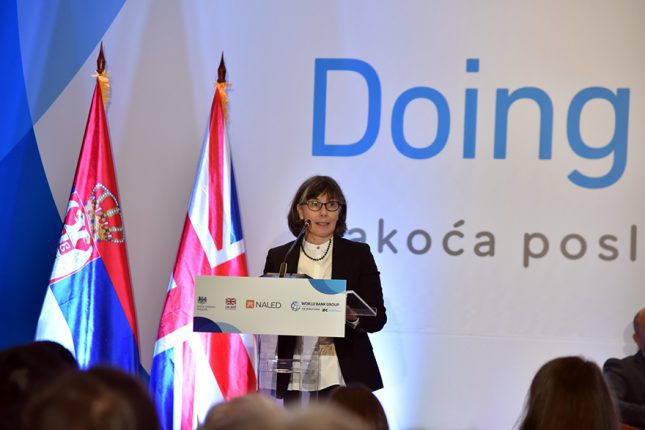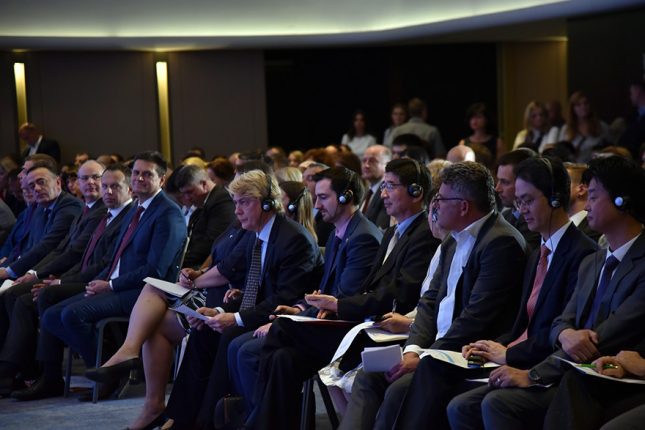The reforms performed by the Ministry of Economy in the field of protecting minority investors and resolving insolvency, as well as the efforts by the Ministry of Construction in further improving the construction permitting system, have fueled Serbia’s progress to the 44th position in the latest Doing Business report, which is a 4-rank advancement compared to the previous year, it was announced at the fourth annual conference “Doing Business 2020” in Belgrade.

The amendments to the Company Law, developed in cooperation between the Ministry of Economy and NALED, provided more rights to minority investors in managing company operations and increased the transparency in activities performed by company management, in cases where potential personal interest for directors may arise. Therefore, this category experienced the highest, 46-rank improvement (from 83rd to 37th). The World Bank also acknowledged the amendments to the Law on Insolvency, which provided creditors with the right to participate in the selection of bankruptcy trustee and receive all information about the insolvency procedure from the trustee, thus resulting in an 8-rank improvement in this area (from 49th to 41st position).

Among the ten indicators observed by the World Bank, the top position is being continuously held by the construction permitting system, a systemic reform that has been continuously shifting Serbia towards the top of this international competitiveness list. The greatest improvement was achieved with the Law on Republic Administrative Fee, whose amendments nearly halved the fee for getting location conditions. Hence, Serbia has advanced by two more positions in this category, now having the best result in the region as well as the record result for the country in this area.
Deputy Prime Minister of Serbia and Minister of Construction, Transport and Infrastructure, prof. PhD Zorana Mihajlović said that for the past several years Serbia has not been competing with the average results, but rather the global top performers.

– Any progress in this list is important, as it means that we are leaving behind the countries that already offer very favourable business conditions. Being ranked 9th in construction permitting, as well as the progress from 48th to 44th position in the overall ranking, oblige us to be even more efficient in implementing reforms in other areas as well, so as to further improve our rating next year. If we could reach top 10 countries in construction permitting, I don’t see why this wouldn’t be possible in some other areas, and this is something we should aspire to – said Mihajlović, who also serves as the President of the Government’s Joint Group for improving Serbia’s position in the World Bank’s ranking.
British Ambassador to Serbia H.E. Sian MacLeod said that the United Kingdom has been among the top ten countries in the Doing Business list for years, highlighting that the UK can share this experience with Serbia.
– I am very pleased to say that the UK Government, through its Good Governance Fund, has been the largest donor in Serbia when it comes to e-government. Not only, the e-Baby service, but also the electronic property registration in the cadaster, open data and many other initiatives – said Ambassador MacLeod.
A further contribution to Serbia’s improved performance was given by the ten-position advancement in terms of getting electricity (from 104th to 94th position). On the other hand, the lowest score was noted in the category of starting a business (decline from 40th to 73rd position) as a result of introducing a new administrative procedure for businesses in the process of registering real owners, where NALED had appealed that this step should not be separated from the procedure of registering a business.

The event organized by NALED in cooperation with the British Embassy, World Bank and International Finance Corporation also highlighted the priorities for further advancement in the Doing Business list.
– Reducing the tax burden on labor, ensuring better availability of planning documents, more efficient delivery of cadaster registration decisions, abolishing tax returns for property, transfer of absolute rights and gift taxes, developing electronic services for registration and payment of tax and non-tax charges, and reducing the time and cost of the enforcement and insolvency procedures, are the key initiatives we are nominating for the agenda we need to pursue in order to reach op 30 countries – said Vladislav Cvetković, President of NALED Supervisory Board.
Thomas Lubeck, IFC’s Regional Manager for Central and Southeast Europe, stressed that the central focus of the Doing Business report is the role of government policy in the daily operations of small and medium-sized domestic firms, which in Serbia have great potential to drive future growth and employment.
– Congratulations to the Serbian authorities on the reform effort and improvement in this year’s Doing Business ranking. The World Bank Group looks forward to continued cooperation to create an enabling environment for Serbia’s private sector – added Lubeck.
Even though the World Bank positively assessed the improvement regarding the time needed for VAT return, the introduction of electronic registration and payment of tax and signage fee was not taken into account. Hence we noted a 6-rank decline in the field of paying taxes (from 79th to 85th). Amendments to the Law on Pledge Right, adopted after the World Bank’s assessment, were also not acknowledged for this year’s report, which influenced a 7-rank decline in the area of getting credit, while a similar situation happened with the reform of property registration procedure.
Namely, this reform noted a small decline, from 55th to 58th position, as the World Bank did not acknowledge that businesses have been spared the need to visit a cadaster counter, even though the registration is now performed automatically with public notaries delivering the registration documents electronically.
In the following report, further progress is expected in the category of enforcing contracts, with the Law on Enforcement and Security introducing novelties such as the e-Auction and e-Bulletin Board, enabling the faster, cost-efficient and more transparent sale of the property, not being taken into account for this year’s edition. In this category, Serbia has held the same rank as the previous year, while no changes in rank have also been recorded in terms of trading across borders (23.).
In the region, Serbia is outranked only by Slovenia and North Macedonia
In the new Doing Business list, among the countries in the region, Serbia has been outranked only by North Macedonia (17) and Slovenia (37), while leaving behind Montenegro (50), Croatia (51), Kosovo (57), Albania (82) and BiH (90). Along with Serbia, progress has also been made by Croatia with a 7-rank advancement (from 58th to 51st) and Slovenia, going up by three ranks (from 40th to 37th). On the other hand, Albania experienced a 19-rank decline (from 63rd to 82nd), as well as Kosovo (from 44th to 57th), North Macedonia (from 10th to 17th), BiH (from 89th to 90th). Montenegro has kept an unchanged rank (50).